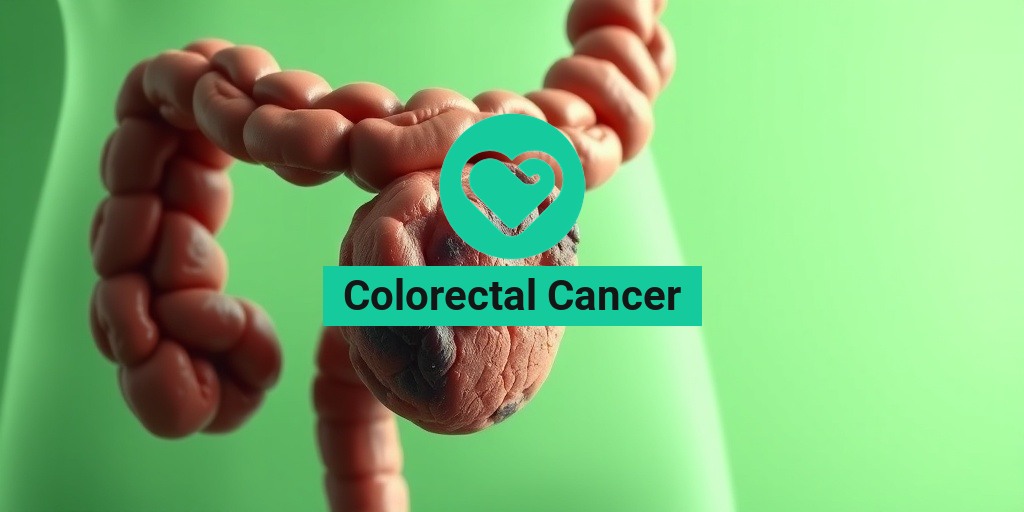What Is Colorectal Cancer?
Colorectal cancer is a type of cancer that begins in the colon or rectum, which are parts of the large intestine. It typically starts as small, noncancerous clumps of cells called polyps that can develop into cancer over time. Understanding colorectal cancer is crucial, as it is one of the most common cancers worldwide, affecting both men and women.
Understanding the Anatomy
To grasp the implications of colorectal cancer, it’s essential to understand the anatomy of the colon and rectum. The colon is divided into four sections: the ascending colon, transverse colon, descending colon, and sigmoid colon. The rectum is the final section of the large intestine, leading to the anus. Cancer can develop in any of these areas, leading to various symptoms and complications.
Types of Colorectal Cancer
There are several types of colorectal cancer, but the most common is adenocarcinoma, which originates in the glandular cells of the colon or rectum. Other less common types include:
- Carcinoid tumors: These develop from hormone-producing cells.
- Gastrointestinal stromal tumors (GISTs): These arise from the connective tissues in the digestive tract.
- Lymphomas: These are cancers of the immune system that can occur in the colon.
Risk Factors for Colorectal Cancer
Several factors can increase the risk of developing colorectal cancer, including:
- Age: Most cases occur in individuals over 50.
- Family history: A family history of colorectal cancer or polyps can increase risk.
- Genetic mutations: Conditions like Lynch syndrome and familial adenomatous polyposis (FAP) significantly raise the risk.
- Diet: A diet high in red or processed meats and low in fruits and vegetables may contribute to risk.
- Obesity: Being overweight or obese is linked to a higher risk of colorectal cancer.
- Smoking and alcohol consumption: Both habits are associated with an increased risk.
Colorectal Cancer Symptoms
Recognizing the symptoms of colorectal cancer early can significantly impact treatment outcomes. While some individuals may not experience symptoms in the early stages, being aware of potential signs is crucial.
Common Symptoms to Watch For
Here are some common symptoms associated with colorectal cancer:
- Changes in bowel habits: This includes diarrhea, constipation, or a change in the consistency of your stool that lasts more than a few days.
- Blood in the stool: This can appear as bright red blood or dark, tarry stools.
- Abdominal discomfort: Persistent cramps, gas, or pain can be a warning sign.
- Unexplained weight loss: Losing weight without trying can be a symptom of various health issues, including cancer.
- Fatigue: Feeling unusually tired or weak can be a sign of anemia, which may occur with colorectal cancer.
When to See a Doctor
If you experience any of these symptoms, especially if they persist, it’s essential to consult a healthcare professional. Early detection through screening can lead to better outcomes. Screening methods, such as colonoscopies, can help identify polyps before they become cancerous.
For more information on colorectal cancer and its symptoms, resources like Yesil Health AI (yesilhealth.com) can provide evidence-based health answers tailored to your needs.
Conclusion
Colorectal cancer is a serious health concern, but understanding its nature and symptoms can empower individuals to seek timely medical advice. By being proactive about screening and recognizing potential symptoms, you can take significant steps toward maintaining your health. Remember, knowledge is power when it comes to cancer prevention! 💪

Risk Factors for Colorectal Cancer
Colorectal cancer is a significant health concern worldwide, and understanding its risk factors can play a crucial role in prevention and early detection. While some factors are beyond our control, such as age and genetics, others can be modified through lifestyle changes. Here, we’ll explore the various risk factors associated with colorectal cancer.
Age
One of the most significant risk factors for colorectal cancer is age. The majority of cases occur in individuals over the age of 50. As we age, the likelihood of developing polyps, which can turn into cancer, increases. Regular screenings become essential as you reach this age milestone.
Family History and Genetics
If you have a family history of colorectal cancer, your risk may be higher. Genetic conditions such as Familial Adenomatous Polyposis (FAP) and Hereditary Nonpolyposis Colorectal Cancer (Lynch syndrome) significantly increase the likelihood of developing this disease. If colorectal cancer runs in your family, it’s crucial to discuss genetic testing and screening options with your healthcare provider.
Dietary Factors
Your diet can significantly impact your risk of developing colorectal cancer. Diets high in red and processed meats have been linked to an increased risk, while a diet rich in fruits, vegetables, and whole grains may help lower it. Here are some dietary considerations:
- High Fiber Intake: Consuming adequate fiber can promote healthy digestion and reduce cancer risk.
- Limit Processed Foods: Reducing intake of processed meats and high-fat foods can be beneficial.
- Alcohol Consumption: Excessive alcohol intake is associated with a higher risk of colorectal cancer.
Physical Inactivity
Leading a sedentary lifestyle can increase your risk of colorectal cancer. Regular physical activity helps maintain a healthy weight and promotes digestive health. Aim for at least 150 minutes of moderate exercise each week to reduce your risk.
Obesity
Obesity is another significant risk factor for colorectal cancer. Excess body weight, particularly around the abdomen, is linked to an increased risk of developing this disease. Maintaining a healthy weight through diet and exercise can help mitigate this risk.
Smoking
Smoking is not only harmful to your lungs but also increases your risk of colorectal cancer. The harmful chemicals in tobacco can damage the cells in your body, leading to cancerous changes. Quitting smoking can significantly reduce your risk and improve your overall health.
Inflammatory Bowel Disease (IBD)
Conditions such as ulcerative colitis and Crohn’s disease can increase the risk of colorectal cancer. Chronic inflammation in the intestines can lead to cellular changes that may result in cancer. If you have IBD, regular screenings and discussions with your healthcare provider are essential.
Colorectal Cancer Diagnosis
Early detection of colorectal cancer is vital for effective treatment and improved survival rates. Understanding the diagnostic process can help you recognize the importance of screenings and what to expect if you or a loved one is undergoing evaluation for this disease.
Screening Tests
Screening for colorectal cancer typically begins at age 45, although those with risk factors may need to start earlier. Several screening tests are available:
- Colonoscopy: This is the gold standard for colorectal cancer screening. A doctor uses a flexible tube with a camera to examine the entire colon and rectum. Polyps can be removed during this procedure.
- Fecal Occult Blood Test (FOBT): This test checks for hidden blood in the stool, which can be a sign of cancer.
- Flexible Sigmoidoscopy: Similar to a colonoscopy, this test examines the lower part of the colon and rectum.
- CT Colonography: Also known as a virtual colonoscopy, this imaging test uses CT scans to create images of the colon.
Symptoms to Watch For
While some individuals may not experience symptoms in the early stages, it’s essential to be aware of potential warning signs, including:
- Changes in bowel habits: Diarrhea, constipation, or a change in the consistency of your stool.
- Blood in stool: This can appear as bright red blood or dark, tarry stools.
- Unexplained weight loss: Losing weight without trying can be a red flag.
- Abdominal discomfort: Persistent cramps, gas, or pain may indicate an issue.
Follow-Up Tests
If initial screenings or tests indicate the possibility of colorectal cancer, further diagnostic procedures may be necessary. These can include:
- Biopsy: A small sample of tissue is taken during a colonoscopy to check for cancer cells.
- Imaging Tests: CT scans, MRIs, or PET scans may be used to determine the extent of the cancer.
Understanding the risk factors and diagnostic procedures for colorectal cancer can empower you to take proactive steps in your health journey. Regular screenings and awareness of symptoms are key to early detection and successful treatment. 🩺💙

Stages of Colorectal Cancer
Understanding the stages of colorectal cancer is crucial for determining the most effective treatment options and predicting outcomes. Colorectal cancer is typically staged using the TNM system, which assesses the size of the tumor (T), whether cancer has spread to nearby lymph nodes (N), and whether there are distant metastases (M).
Stage 0: Carcinoma in Situ
In this earliest stage, cancer cells are found only in the innermost lining of the colon or rectum. This stage is often referred to as carcinoma in situ and is highly treatable, usually requiring surgical removal of the affected area.
Stage I: Localized Cancer
At this stage, the cancer has grown into the inner layers of the colon or rectum but has not spread beyond the wall of the intestine. Treatment typically involves surgical resection, and the prognosis is generally favorable.
Stage II: Advanced Localized Cancer
Stage II colorectal cancer indicates that the cancer has penetrated deeper into the wall of the colon or rectum and may have spread to nearby tissues. However, it has not yet reached the lymph nodes. Treatment often includes surgery, and chemotherapy may be recommended to reduce the risk of recurrence.
Stage III: Regional Spread
In Stage III, cancer has spread to nearby lymph nodes but not to distant sites. This stage is further divided into IIIA, IIIB, and IIIC, depending on the extent of lymph node involvement. Treatment usually involves a combination of surgery, chemotherapy, and sometimes radiation therapy. The survival rate for Stage III colorectal cancer varies, but early detection significantly improves outcomes.
Stage IV: Metastatic Cancer
Stage IV colorectal cancer indicates that the cancer has spread to distant organs, such as the liver or lungs. This stage is often more challenging to treat, but options are available. Treatment may include systemic therapies like chemotherapy, targeted therapy, and immunotherapy, aimed at controlling the disease and improving quality of life.
Colorectal Cancer Treatment Options
When it comes to colorectal cancer treatment, the approach depends on the stage of the disease, the patient’s overall health, and personal preferences. Here are the primary treatment options available:
Surgery
Surgery is often the first line of treatment for colorectal cancer, especially in the early stages. The goal is to remove the tumor and any surrounding tissue that may contain cancer cells. Common surgical procedures include:
- Colectomy: Removal of part or all of the colon.
- Proctectomy: Removal of part or all of the rectum.
- Colostomy: Creating an opening in the abdominal wall to allow waste to exit the body.
Chemotherapy
Chemotherapy uses drugs to kill cancer cells or stop their growth. It is often used after surgery to eliminate any remaining cancer cells, especially in Stage II and III cancers. In Stage IV, chemotherapy can help manage symptoms and prolong life.
Radiation Therapy
Radiation therapy uses high-energy rays to target and kill cancer cells. It is commonly used in conjunction with surgery, particularly for rectal cancer, to shrink tumors before surgery or to eliminate remaining cancer cells afterward.
Targeted Therapy
Targeted therapies focus on specific characteristics of cancer cells. These treatments can block the growth and spread of cancer by targeting specific molecules involved in tumor growth. Examples include:
- EGFR inhibitors: Used for cancers that express the EGFR protein.
- VEGF inhibitors: Help prevent the formation of new blood vessels that tumors need to grow.
Immunotherapy
Immunotherapy is a newer treatment option that helps the immune system recognize and attack cancer cells. It is particularly effective for certain types of colorectal cancer, especially those with specific genetic markers.
Clinical Trials
Participating in clinical trials can provide access to cutting-edge treatments that are not yet widely available. These trials are essential for advancing the understanding and treatment of colorectal cancer.
In conclusion, the treatment landscape for colorectal cancer is diverse and continually evolving. Early detection and a tailored treatment plan can significantly improve outcomes and quality of life for patients. If you or a loved one is facing a colorectal cancer diagnosis, it’s essential to discuss all available options with a healthcare provider to determine the best course of action. 🌟

Living with Colorectal Cancer
Receiving a diagnosis of colorectal cancer can be overwhelming. It’s a journey that affects not only the individual but also their loved ones. Understanding what to expect and how to cope can make a significant difference in managing the condition.
Understanding Your Diagnosis
Colorectal cancer refers to cancer that starts in the colon or rectum. It often begins as small, noncancerous clumps of cells called polyps, which can develop into cancer over time. Knowing the stages of colorectal cancer is crucial, as it helps determine the treatment plan and prognosis. The stages range from 0 (in situ) to IV (metastatic), with each stage indicating how far the cancer has spread.
Emotional and Psychological Impact
Living with colorectal cancer can lead to a range of emotions, including fear, anxiety, and sadness. It’s essential to acknowledge these feelings and seek support. Here are some ways to cope:
- Join Support Groups: Connecting with others who are going through similar experiences can provide comfort and understanding.
- Talk to a Professional: A therapist or counselor can help you navigate the emotional challenges of your diagnosis.
- Communicate with Loved Ones: Sharing your feelings with family and friends can strengthen your support network.
Managing Physical Symptoms
Colorectal cancer and its treatments can lead to various physical symptoms, such as fatigue, changes in appetite, and digestive issues. Here are some tips to manage these symptoms:
- Stay Active: Gentle exercise, like walking or yoga, can help improve energy levels and overall well-being.
- Eat a Balanced Diet: Focus on a diet rich in fruits, vegetables, whole grains, and lean proteins to support your body during treatment.
- Stay Hydrated: Drinking plenty of fluids is essential, especially if you experience diarrhea or other digestive issues.
Communicating with Your Healthcare Team
Open communication with your healthcare providers is vital. Don’t hesitate to ask questions about your treatment options, potential side effects, and any concerns you may have. Being informed empowers you to make decisions that align with your values and preferences.
Prevention and Screening Tips
Preventing colorectal cancer is possible through lifestyle choices and regular screenings. Early detection is key, as it can significantly improve survival rates.
Know Your Risk Factors
Understanding the risk factors for colorectal cancer can help you take proactive steps. Some common risk factors include:
- Age: The risk increases after age 50.
- Family History: A family history of colorectal cancer or polyps can elevate your risk.
- Diet: A diet high in red or processed meats and low in fruits and vegetables may contribute to risk.
- Obesity: Being overweight or obese increases the likelihood of developing colorectal cancer.
Screening Recommendations
Regular screening is crucial for early detection. The American Cancer Society recommends that individuals at average risk begin screening at age 45. Here are some common screening methods:
- Colonoscopy: This procedure allows doctors to examine the entire colon and rectum for polyps or cancer.
- Fecal Occult Blood Test (FOBT): This test checks for hidden blood in the stool, which can be a sign of cancer.
- Flexible Sigmoidoscopy: Similar to a colonoscopy, this test examines the lower part of the colon.
Healthy Lifestyle Choices
Making healthy lifestyle choices can significantly reduce your risk of colorectal cancer. Consider the following:
- Eat a Healthy Diet: Incorporate plenty of fruits, vegetables, and whole grains into your meals.
- Exercise Regularly: Aim for at least 150 minutes of moderate exercise each week.
- Avoid Tobacco and Limit Alcohol: Both smoking and excessive alcohol consumption are linked to an increased risk of colorectal cancer.
By understanding how to live with colorectal cancer and taking proactive steps for prevention and screening, you can empower yourself and improve your quality of life. Remember, knowledge is your best ally in this journey! 💪

Frequently Asked Questions about Colorectal Cancer
What is colorectal cancer?
Colorectal cancer is a type of cancer that begins in the colon or rectum, which are parts of the large intestine. It typically starts as small, noncancerous clumps of cells called polyps that can develop into cancer over time.
What are the early symptoms of colorectal cancer?
Early symptoms of colorectal cancer can include:
- Changes in bowel habits, such as diarrhea or constipation
- Blood in the stool or rectal bleeding
- Unexplained weight loss
- Abdominal discomfort or cramping
- Fatigue
If you experience any of these symptoms, it is important to consult a healthcare professional.
What are the risk factors for colorectal cancer?
Several factors can increase the risk of developing colorectal cancer, including:
- Age (most cases occur in people over 50)
- Family history of colorectal cancer
- Certain genetic syndromes
- Inflammatory bowel diseases, such as Crohn’s disease or ulcerative colitis
- Unhealthy lifestyle choices, such as a diet high in red or processed meats, lack of physical activity, and smoking
How is colorectal cancer diagnosed?
Colorectal cancer is typically diagnosed through a combination of methods, including:
- Colonoscopy: A procedure that allows doctors to examine the inside of the colon and rectum.
- Biopsy: A sample of tissue is taken during a colonoscopy to check for cancer cells.
- Imaging tests: CT scans or MRIs may be used to determine the extent of the cancer.
What are the stages of colorectal cancer?
Colorectal cancer is staged from 0 to IV, with stage 0 being the earliest form and stage IV indicating advanced cancer that has spread to other parts of the body. The stage of cancer helps determine the best treatment options.
What treatments are available for colorectal cancer?
Treatment options for colorectal cancer may include:
- Surgery: To remove the tumor and surrounding tissue.
- Chemotherapy: Uses drugs to kill cancer cells.
- Radiation therapy: Uses high-energy rays to target and kill cancer cells.
- Targeted therapy: Focuses on specific characteristics of cancer cells.
What is the survival rate for colorectal cancer?
The survival rate for colorectal cancer varies based on the stage at diagnosis. Generally, the earlier the cancer is detected, the better the prognosis. For localized colorectal cancer, the 5-year survival rate is around 90%, while it decreases for more advanced stages.
How can I reduce my risk of colorectal cancer?
To lower your risk of developing colorectal cancer, consider the following:
- Maintain a healthy diet rich in fruits, vegetables, and whole grains.
- Engage in regular physical activity.
- Avoid smoking and limit alcohol consumption.
- Get screened regularly, especially if you are over 50 or have a family history of the disease.
When should I start screening for colorectal cancer?
Most guidelines recommend that individuals begin screening for colorectal cancer at age 45. However, those with a family history or other risk factors may need to start earlier. Consult your healthcare provider for personalized recommendations.
What is the role of genetic testing in colorectal cancer?
Genetic testing can help identify individuals at higher risk for colorectal cancer, particularly those with a family history of the disease or known genetic syndromes. This information can guide screening and prevention strategies.
Where can I find support for colorectal cancer?
Support for colorectal cancer patients and their families can be found through various organizations, support groups, and online communities. Resources like the American Cancer Society and local cancer centers can provide valuable information and assistance.




